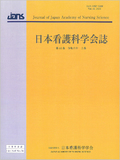Japanese
English
- 販売していません
- Abstract 文献概要
- 参考文献 Reference
要旨
目的:新卒看護師の社会人基礎力と倫理的行動がリアリティショックにどの程度影響を与えるのかを明らかにすることである.
方法:2022年4月に入職した新卒看護師を対象に質問紙調査を実施し,社会人基礎力,倫理的行動とリアリティショックの関連を探索するために共分散構造分析を行った.
結果:調査票1,295部を送付した結果,有効回答数240名(有効回答率18.5%)だった.社会人基礎力,倫理的行動,リアリティショックの関係は,社会人基礎力と倫理的行動は関係があり(β=0.60,p<0.001),社会人基礎力が高いとリアリティショックのポジティブ因子が高くなり(β=0.55,p<0.001)ネガティブ因子は低くなる(β=−0.81,p<0.001).
結論:倫理的行動とリアリティショックの間に直接的な関連は確認されなかったが,社会人基礎力が向上するとリアリティショックが軽減することが示唆された.
Objective: To determine the extent to which the basic work-related skills and ethical behavior of new graduate nurses influence their reality shock.
Methods: An anonymous self-administered questionnaire survey was conducted of new graduate nurses who started working in April 2022. A structural equation modeling was used to analyze the relationship among the basic work-related skills, ethical behavior, and reality shock of new graduate nurses.
Results: Of the 1295 questionnaires sent, 240(18.5%) valid responses were obtained. There was a significant relationship between basic work-related skills and ethical behavior(β=0.60, p<0.001). When the number of basic work-related skills were high, the positive factor of reality shock significantly increased(β=0.55, p<0.001) whereas the negative factor of reality shock significantly decreased(β=-0.81, p< 0.001).
Conclusion: Although no direct correlation was confirmed between ethical behavior and reality shock, reality shock might be reduced if the number of basic work-related skills are high.
Copyright © 2024, Japan Academy of Nursing Science. All rights reserved.


